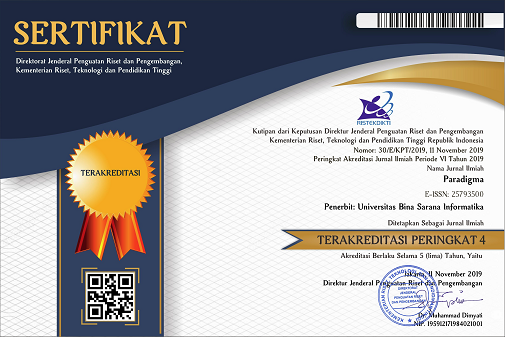Klasifikasi Algoritma Naïve Bayes dan SVM Berbasis PSO Dalam Memprediksi Spam Email Pada Hotline-Sapto
Abstract
Accreditation can be interpreted as an effort by the government to standardize and guarantee the quality of college alumni so that the quality of verification between universities is not too varied and in accordance with work needs. SAPTO or Online Higher Education Accreditation System is a system organized by BAN-PT for the online higher education accreditation process. Developed to improve the efficiency and quality of higher education accreditation processes. At Sapto, the University acts as an entity that submits accreditation proposals for both the Higher Education Accreditation and the Study Program Accreditation. BAN-PT has approved a complaint service related to technical issues in SAPTO that can be addressed to the hotline-sapto email account. BAN-PT has a question and answer service through the e-mail hotline sapto which can be used by universities to facilitate related to the accreditation process with sapto. Submission and questions about the accreditation process with Sapto are still responded more quickly by staff who work as public relations BAN-PT. This relates to direct question and answer questions and also a lot of time spent reading or sending spam messages as well as unwanted irrelevant questions. Email technology is also used a lot not for positive purposes so as to benefit from spam email. On this occasion the research that will be conducted is the classification of spam emails from the hotline-sapto account and preprocessing and the calculation of its accuracy, AUC with various data mining classification methods, including the Naïve Bayes algorithm, Support Vector Machine (SVM), this method is used to predict spam emails with that is the purpose of the algorithm chosen is the most accurate algorithm that can predict spam emails. From the test results obtained by the calculation of the SVM method with PSO get an accuracy value of 85.25% with AUC of 0.892
Keywords
Full Text:
PDF (Bahasa Indonesia)References
Argal, A., Gupta, S., Modi, A., Pandey, P., Shim, S., & Choo, C. (2018). Intelligent travel chatbot for predictive recommendation in echo platform. 2018 IEEE 8th Annual Computing and Communication Workshop and Conference, CCWC 2018. https://doi.org/10.1109/CCWC.2018.8301732
Basari, A. S. H., Hussin, B., Ananta, I. G. P., & Zeniarja, J. (2013). Opinion mining of movie review using hybrid method of support vector machine and particle swarm optimization. Procedia Engineering. https://doi.org/10.1016/j.proeng.2013.02.059
Bustami. (2014). Penerapan Algoritma Naive Bayes. Jurnal Informatika.
Chou, J. S., Cheng, M. Y., Wu, Y. W., & Pham, A. D. (2014). Optimizing parameters of support vector machine using fast messy genetic algorithm for dispute classification. Expert Systems with Applications. https://doi.org/10.1016/j.eswa.2013.12.035
Gorunescu, F. (2011). Data Mining: Concepts,Models and Techniques.
Han, J., Kamber, M., & Pei, J. (2012). Data Mining: Concepts and Techniques. In Data Mining: Concepts and Techniques. https://doi.org/10.1016/C2009-0-61819-5
Muhamad Abdul Ghani, A. S. (2018). Email Spam Filtering Dengan Algoritma Random Forest.
Sharmila, A., & Geethanjali, P. (2016). DWT Based Detection of Epileptic Seizure from EEG Signals Using Naive Bayes and k-NN Classifiers. IEEE Access. https://doi.org/10.1109/ACCESS.2016.2585661
Shiela Novelia Dharma Pratiwi, B. S. S. U. (2016). Klasifikasi EmailSpam dengan Menggunakan Metode Support Vector Machinedan k-Nearest Neighbor. 344–349.
Tandel, S. S., Jamadar, A., & Dudugu, S. (2019). A Survey on Text Mining Techniques. 2019 5th International Conference on Advanced Computing and Communication Systems, ICACCS 2019. https://doi.org/10.1109/ICACCS.2019.8728547
Veldt, N., Gleich, D. F., & Wirth, A. (2019). Learning resolution parameters for graph clustering. The Web Conference 2019 - Proceedings of the World Wide Web Conference, WWW 2019. https://doi.org/10.1145/3308558.3313471
Vinodhini, G., & Chandrasekaran, R. (2012). International Journal of Advanced Research in Computer Science and Software Engineering Sentiment Analysis and Opinion Mining: A Survey. International Journal of Advanced Research in Computer Science and Software Engineering.
Wang, C., & Blei, D. M. (2011). Collaborative topic modeling for recommending scientific articles. Proceedings of the ACM SIGKDD International Conference on Knowledge Discovery and Data Mining. https://doi.org/10.1145/2020408.2020480
DOI: https://doi.org/10.31294/p.v22i1.7842
Copyright (c) 2020 Merio Hengki, Mochamad Wahyudi

This work is licensed under a Creative Commons Attribution-ShareAlike 4.0 International License.








